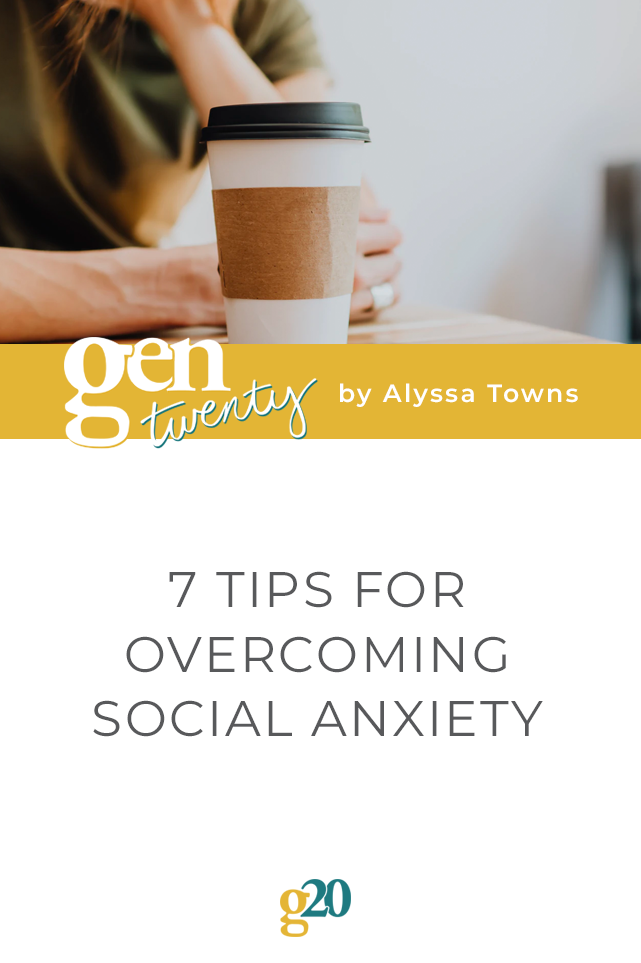
Social anxiety symptoms manifest in a variety of ways and at varying severities for each unique individual. Today, I’m sharing seven tips for overcoming social anxiety that helped me.
While some have social anxiety on occasion, others may have Social anxiety disorder (SAD) in which the fear of being watched, embarrassed, or humiliated is debilitating. SAD is one of the most common but underdiagnosed mental health conditions; roughly 13% of the general population experience symptoms at some point during their lifetime.
Please skip these tips and consider making an appointment with a mental health professional or medical professional if you believe you may have SAD and require immediate attention.
Many people, myself included, have experienced feelings of social anxiety. If you feel anxiety about being in a social situation, you are not alone. These tips are here to help with overcoming social anxiety.
7 Tips for Overcoming Social Anxiety
Acknowledge that anxiety is normal.
First and foremost, anxiety is a normal stress reaction, and it isn’t completely avoidable. I used to think life would be so much easier if I never had to feel anxious again.
Still, it’s essential to realize that anxiety is a healthy emotion, just like many of the positive feelings we experience and crave. Read more about healthy versus unhealthy amounts of anxiety in Medical News Today.
Change your mindset around fear and befriend it.
The situations I found myself most anxious about tended to revolve around fears that I didn’t want to face. For example, have you ever sent an email and worried that there was an embarrassing typo or that you said something incorrectly or offensive? The anxiety I experienced in these situations never had anything to do with the email itself.
Instead, it was about the amount of ridicule, judgment, or punishment I might face on the other side of hitting send. Today I hit send on emails without overthinking the situation, and I’ve learned that fear is an opportunity to learn.
Embrace your fears as learning lessons rather than as failures. We have to stop worrying about things we can’t control. When you befriend your fears and frame them in a positive light, they instantly become less scary.
Practice meditation to reduce your general stress levels and develop relaxation techniques.
Meditation is a great way to familiarize yourself with your body and physical sensations that arise in various scenarios. You can practice meditation anywhere that works best for you, and it’s easy to get started, even if you’ve never practiced before.
This article on Headspace goes into detail about the benefits of meditation related to anxiety, and you can dive into a meditation practice using the Headspace app.
Learning relaxation techniques goes hand-in-hand with meditation, and there are oodles of free relaxation resources online. One of my favorites is this Alternate Nostril Breathing video on the Yoga with Adriene Youtube channel. Breathing techniques are valuable to learn and use to calm anxiety.
Expose yourself to social situations that make you uncomfortable. Start small, and work your way up to larger levels of discomfort gradually.
It can be easy to avoid social situations when they make you feel overwhelmingly uncomfortable. One of the best ways to become more comfortable is to expose yourself to and participate in situations you want to avoid.
Start small with minor interactions such as greeting someone in an elevator, or reaching out to a stranger on Linkedin, so you don’t overwhelm yourself. Over time, you can gradually work your way up to more extensive social situations such as happy hour with a small group, followed by a presentation in front of 10 folks, etc.
If you’re feeling anxious, say it out loud and release it.
Remember, anxiety is a normal, healthy emotion, so if you’re feeling anxious, don’t be afraid to say it out loud! I use to have a bad habit of letting anxiety fester internally.
Once I started to tell my loved ones or friends how I was feeling, I released some of the stress just by admitting it. Say it out loud, send a text message to someone you trust, or write it down and rip it up.
Disconnect and spend some time in nature. Get out of your head by focusing on the world around you.
It can be easy to get caught up in your anxious thoughts and not be able to free yourself from them. I’ve been there more times than I can count! If you find yourself in this scenario, try disconnecting and spending some time outside.
If you’re up for the challenge, ditch all of your electronics (headphones included) and head to a new location to explore. For me, that’s a new hiking trail buried in the mountains. Choose what works best in your area, but open your mind to fully exploring your surroundings without interruption.
Focus on sights, smells, and noises in the present moment. Unplugging is a great tip for overcoming social anxiety. You never realize how much time you spend looking at screens until you stop.
Surround yourself with a community to lift you when you’re feeling anxious.
Build a supportive community if you don’t have one already. Lean on them when your anxiety is too much to bear on your own. Having a trustworthy, reliable, understanding group of folks that you can turn to when you need them helps make those anxious moments more tolerable.
If you aren’t getting the level of support you need from your current community, consider adding new members to your circle. Talk to your closest loved ones about what you need from them in times of anxiety.
